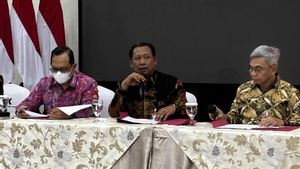YOGYAKARTA - Single people or single people often get stigma and negative treatment in society. Not only in Indonesia, in many countries people who are single or single often get discriminated against. There are unfair treatment just because someone is not paired, like most people.
This unfair treatment of singles or singles is known as a singularity. This negative treatment and view can be experienced by those who are themselves because they are not married, or for people who are single because of divorce.
In people who think that marriage or marriage is important, a lot of singularism is found. Even though a single or single person is everyone's right and should not receive negative criticism or stereotypes. So what is a singularity and for example?
Perhaps the term singularity is still foreign to the ears of many people. Based on the Cambridge dictionary, the singularity is unfair treatment of people who are single (not married-yet) or unfair treatment to people who are single or not married.
Singalism can also be interpreted as stereotypes and stigmatization of single people. It is often found that people's habits are low or bad at single status. It is as if a single man or woman is considered a strange or different individual from the general one.
The term singularity was popularized by Bella DePaulo, a psychologist and author of psychology books. Bella introduced the term singularity through her blog "Living Single". The deployment of the singularity delivered by Bella was then added to the Cambridge English Dictionary.
Bella DePaulo first used the word singularity in the paper published in a joint article with Wendy Morris entitled 'Singles in society and in science'. On page 60 of the book, Bella and Wendy call it the following:
One of the most important implications of Marriage and Family Ideology is that adults who are single in contemporary American society are stigmatized groups. Therefore, they are subjected to negative stereotypes, interpersonal rejections, economic losses, and discrimination (Crocker, Major, & airing, 1998). We refer to this antisingles sentiment as a singularity."
SEE ALSO:
Through an article entitled What It Is, Why It Matters, and How to Stop It, Bella and her co-authors explain how singles are targeted for stigmatization, stereotypes, and discrimination. This treatment can occur in various fields, such as religion, workplace, politics, media, educational places, and other daily life.
Bella strengthened her findings through experimental studies, analysis of laws and policies, and personal experiences.
Singalism is analogized the same as racism and sexism that occurs in the general public. The term singularism is not only attached to single people, but is related to the status of marriage. Like racism does not refer specifically to women and racism does not mention certain races.
So the singularity also does not refer to single people or not. Bella emphasized that the singularity is used as glasses in certain marital status which is stereotypical and discrimination. While single people are those who are subject to sanctions of singularism.
Bias or unfair treatment experienced by married people is not the same as single people. Single or unmarried people often get unfair treatment with the motive of their status.
In Indonesia, for example, single people are often referred to as old virgins or old virgins because they are considered not to have a partner. Even though they are single or single, they are because of their own choice. They feel comfortable and have no problem being single men or women without a partner.
That's a review of what is a singularity and for example in everyday life. The phenomenon of singularism is still found in the people of Indonesia. But getting here, many people are increasingly concerned and understand people who decide to remain single or not. Also read the most popular dating application in the world.
Stay up to date with the latest domestic and other overseas news on VOI. We present the latest and most updated nationally and internationally.
The English, Chinese, Japanese, Arabic, and French versions are automatically generated by the AI. So there may still be inaccuracies in translating, please always see Indonesian as our main language. (system supported by DigitalSiber.id)


















